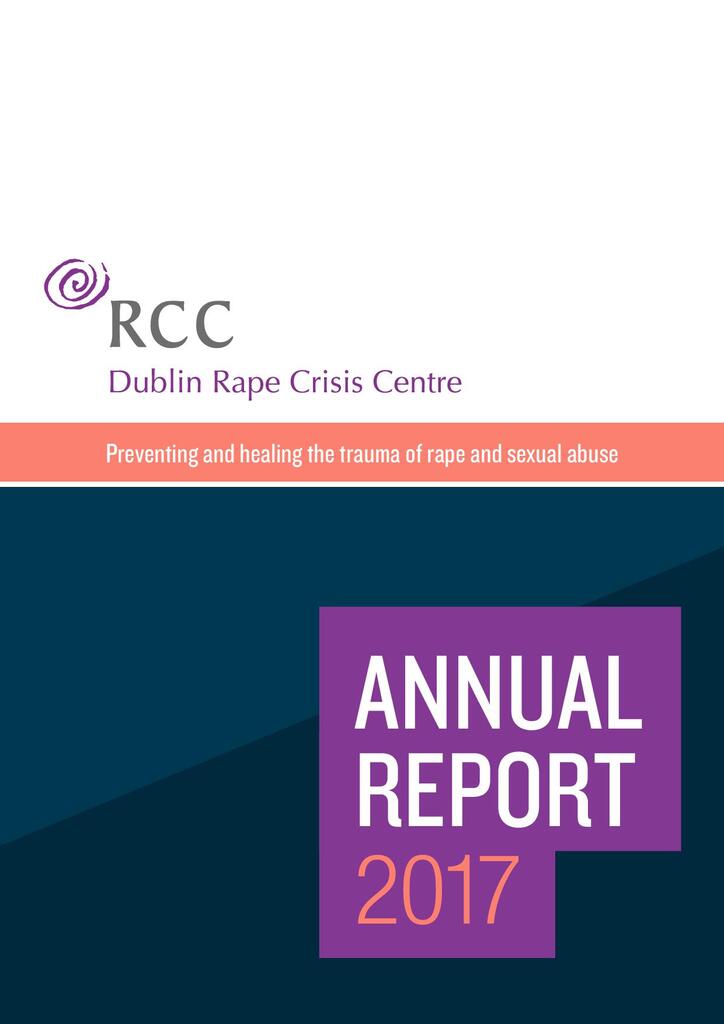Garda Commissioner Drew Harris will today launch Dublin Rape Crisis Centre’s 2017 Annual Report at their offices in Dublin.
26 November 2018

The Centre saw an increase in the numbers making contact by phone and in person in 2017, according to the Report.
The National 24-Hour Helpline run by the Centre had 12,855 contacts, an increase of almost 500 on the previous year. In addition, the Centre benefitted from additional funding in 2017 from Túsla which allowed them to provide therapy for 550 face-to-face clients, an increase of 10% on the previous year.
In its contact with the criminal justice system, Centre personnel accompanied 251 people to examinations at the Sexual Assault Treatment Unit at the Rotunda in Dublin where forensic evidence is collected and victims are given medical care. They also provided support on 53 days to victims who were making a criminal complaint either at a Garda station or in court.
The annual report describes the Centre’s training work as having a role to play in the achievement of societal change as well as equipping others to deal with those who have suffered sexual violence.
Garda Commissioner Drew Harris said “it is a privilege to be present to launch this report which shows the vital work being done by the Dublin Rape Crisis Centre in providing victims of serious sexual assault with victim centred services. This helps to inform the work of An Garda Síochána and other agencies dealing with these victims”.
Dublin Rape Crisis Centre Chairperson Ann Marie Gill said: “This report not only shows that we were exceptionally busy in 2017, but that we continued to have a dual focus to ensure that those who suffer sexual violence get the support that they need and deserve and also to ensure that we are working towards a safer society where sexual violence is no longer acceptable or tolerated.”
The Centre’s CEO Noeline Blackwell said: “We are pleased to be launching this report during the annual international campaign of Sixteen Days of Activism against Violence against Women. While we support and provide services to people of all genders, it is noteworthy that sexual violence is predominantly perpetrated against women and girls. This means that there needs to be a particular emphasis on eliminating or at least reducing the level of sexual violence against them.”
Turning to the treatment of victims within the criminal justice system, Ms. Blackwell complimented the good work that is done by Gardaí who are fully trained in the investigation of sexual offences. However, she pointed to the continued lack of specialist units or investigators to deal with what she called “these sensitive investigations” which, when poorly handled, can lead to victims withdrawing from the criminal justice system and being re-victimised by the experience. Ms. Blackwell said: “When you combine this with the systemic difficulties of our court system in such trials, it is little wonder that there is such a high rate of drop-out between reporting and trial and even a very low rate of reporting”. She noted that in 2018, the Centre has taken on a person to focus on developing their accompaniment and support justice services.
The Centre delivered 3,883 appointments in 2017, mostly in Dublin City Centre but also in Coolock, Dóchas Centre at Mountjoy and in Tallaght. Presenting the overview of the therapy and counselling work of the centre, Head of Clinical Services Angela McCarthy said: “We are continuing to see an increase in the number of callers and clients who have experienced recent rape and sexual assault. Nearly 48% of Helpline contacts related to adult rape, compared to 41% of 2016 contacts. Of new clients seen in 2017, 49% had experienced recent rape or sexual assault.”
/End
Spokesperson: Noeline Blackwell, 01 661 4911.
Editor’s Notes
1. This press release was issued on Friday evening, 23 November 2018, embargoed for Monday 26 November 2018 at 12.01 a.m. This updated version contains a comment from Garda Commissioner Drew Harris but is otherwise unchanged.
2. The Annual Report will be available for download on the DRCC website from 3pm on Monday 26th November: www.drcc.ie
3. Dublin Rape Crisis Centre is a non-governmental, voluntary organisation which has as its mission to prevent the harm and heal the trauma of rape. It offers a suite of services to victims of sexual violence. It runs the National 24-hour Helpline for those who need it in any part of the country. It offers face to face therapy and accompaniment to the Rotunda Sexual Assault Treatment Unit, to court or to Garda stations to people in Dublin and in surrounding areas from its offices at Leeson Street. There are outreach offices at Coolock Civic Centre, Dóchas Women’s Centre, Mountjoy Prison and Tallaght Hospital.
4. We ask that when reporting on this topic, journalists remember that discussions on sexual violence can trigger personal trauma in those receiving the information. Where possible, please make reference to the National 24-hour helpline number 1800 77 88 88 for anyone who may be affected by the discussion.